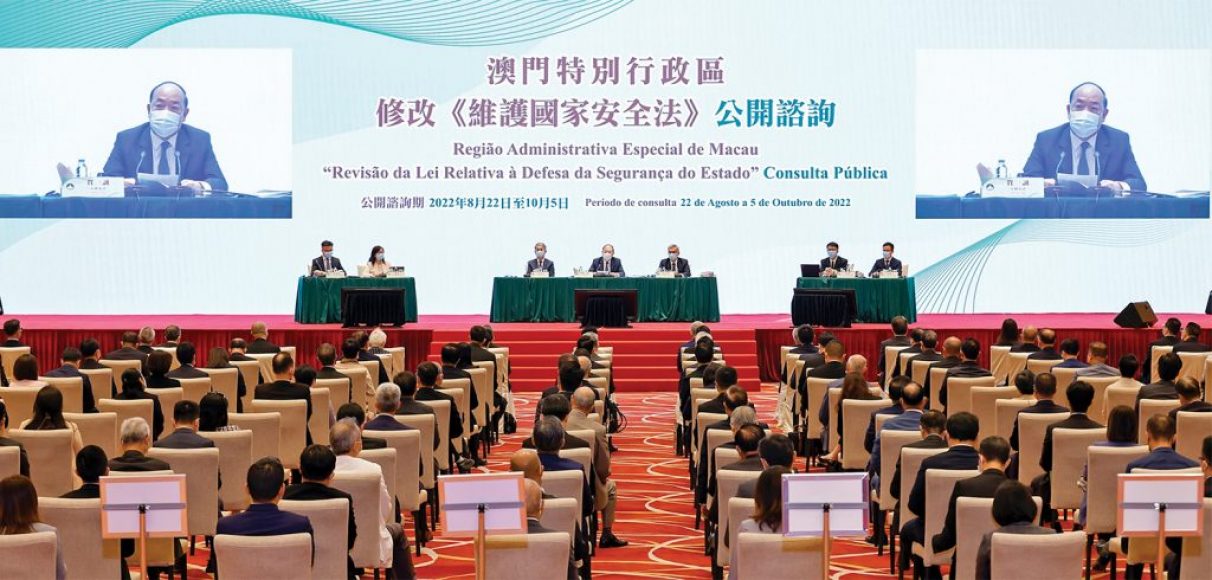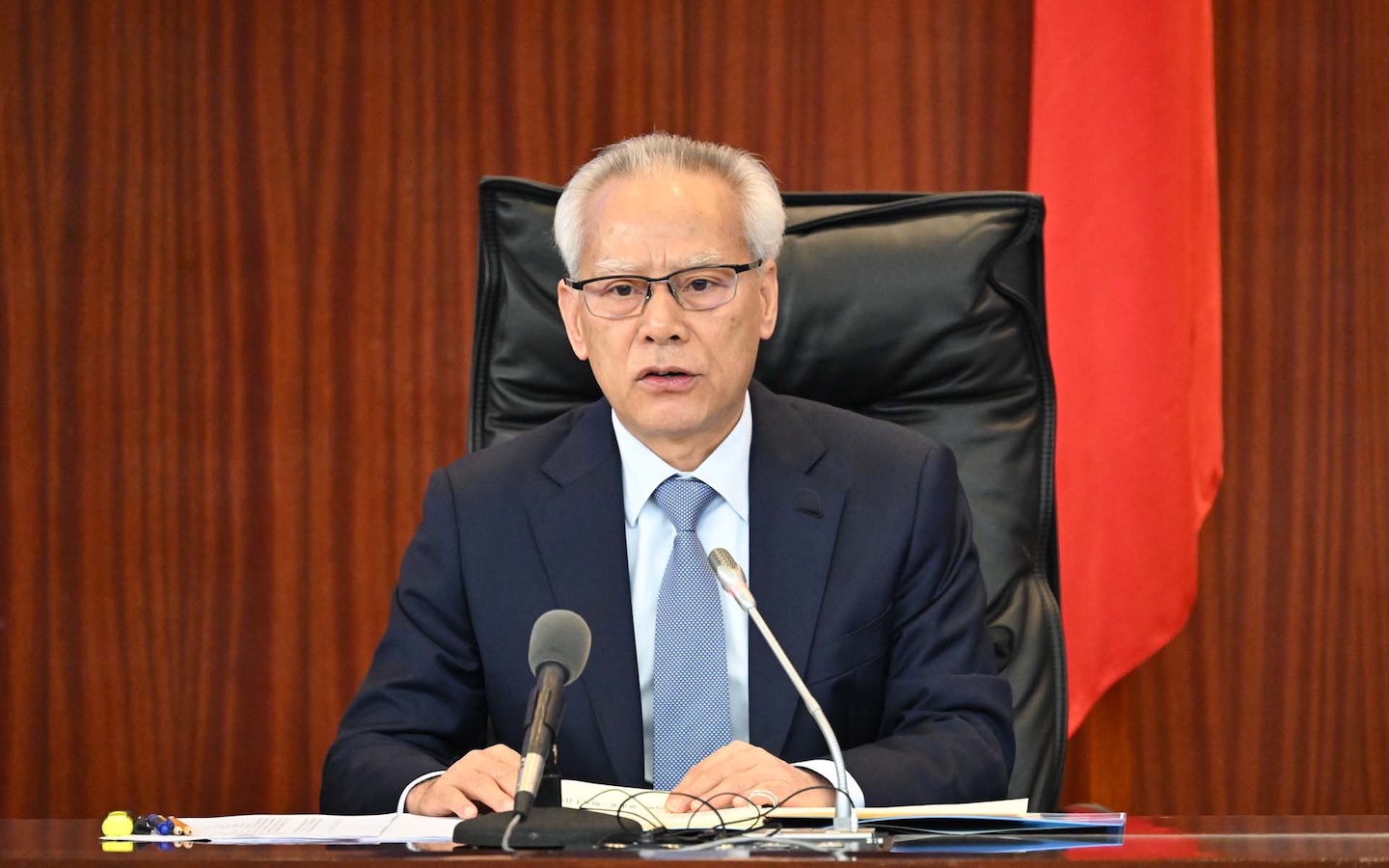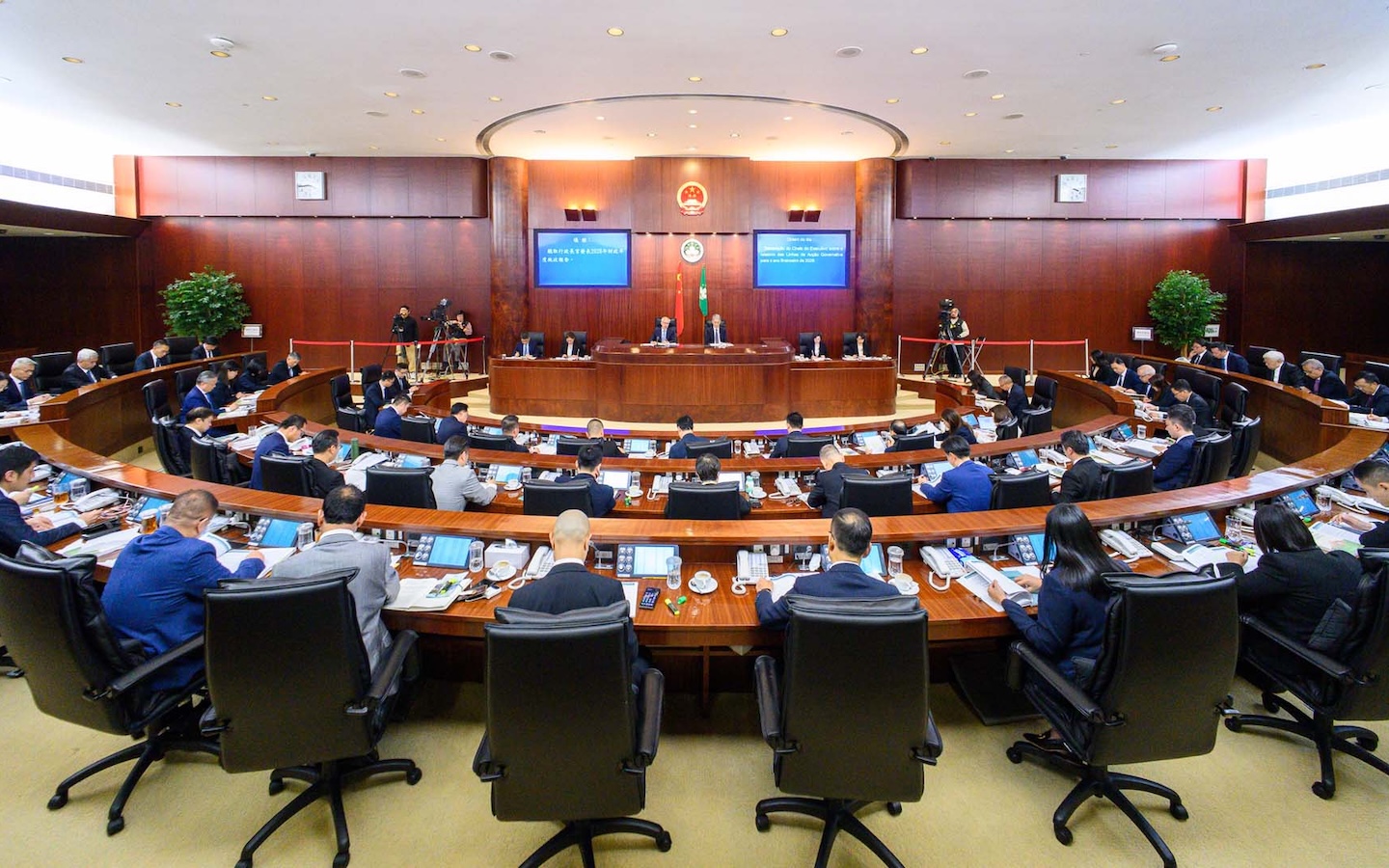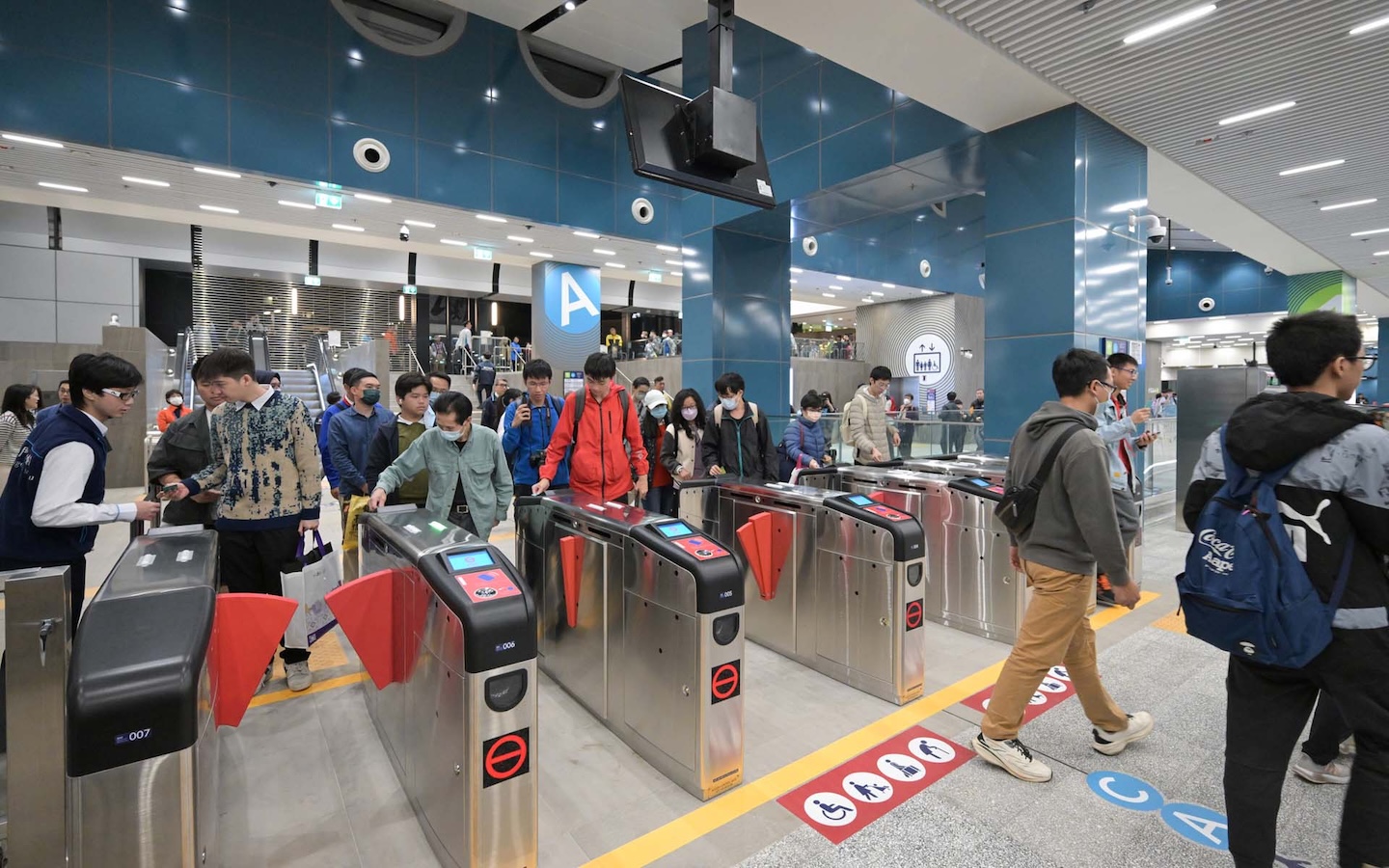The Macao government launched in August a 45-day public consultation on the draft of its national security law’s amendment bill, which aims to ensure that Macao’s legal system on the protection of national security will be as capable of safeguarding national security as the respective laws in the mainland and Hong Kong.
The proposed amendments also aim to ensure that Macao’s national security law will conform to the requirements outlined by Overall National Security Outlook, thereby making Macao more capable of tackling non-traditional threats to national security.
In addition, the proposed amendments aim to strengthen the local government’s ability to prevent external hostile forces from interfering in Macao affairs.
During a public consultation session on the amendment bill for Macao’s deputies to the National People’s Congress (NPC), the local members of the National Committee of the Chinese People’s Political Consultative Conference (CPPCC) and representatives from the political and legal sectors, Chief Executive Ho Iat Seng pointed to four goals concerning the government’s proposed amendments.
The chief executive said that the proposed amendments to the national security law, which are slated to be submitted to the Legislative Assembly are closely related to the nation’s long-term stability and Macao’s prosperity and stability.
Ho said that the current national security law, which was enacted back in 2009, based on Article 23 of the Macao Basic Law, needed to be amended because of major changes in the international and external security situation and also due to the severe security threats that the country is facing from various areas.
Ho pledged that his government will listen to views from all sectors of civil society and indicated that the aim of the consultation is to enable the government to respond more effectively to national security challenges.
In his speech, Ho declared that “Macao must be proactive in tackling all kinds of security risks. Macao must have a strong and more practical law in safeguarding national security, in order to prevent and suppress any interference by external forces and to safeguard more effectively national sovereignty, security and development interests.”
He added that the proposed amendments also amount to a proactive step “based on current development trends and the need to target actual national security issues. Consequently, Macao must uphold its bottom-line thinking and conduct comprehensive risk assessments and precise judgements concerning the amendment process. Safeguarding national security is not only the constitutional responsibility of the Macao Special Administrative Region (MSAR) but also the legal responsibility of all Chinese people including Macao residents.”
Talking to more than 200 people, the chief executive said, “during the consultation period, people with ulterior motives might make a big fuss over the proposed amendments, or even agitate in order to impede or undermine the amendment process through radical approaches.”
He called on the public “to refute all hostile attacks and untrue information about the amendments, and have a clear-cut stance on guiding the amendment process and eliminating all potential interference.”
Way forward for the economic development of Macao
According to a draft released in August during a press conference held by Secretary for Security Wong Sio Chak, the local government is proposing to extend the coverage of certain existing criminal offences listed in the local national security law, and add new criminal offences to the law.
The local government also proposes to upgrade its national security law to a complete and comprehensive piece of legislation, a change from the current version which is merely a criminal law that punishes offences endangering national security.
Wong said that the security landscape globally, as well as in countries and regions surrounding Macao, has seen profound changes since the implementation of the local national security law. Given the ongoing interrelation of traditional security threats and non-traditional ones, Wong said, the nation’s and Macao’s security and development are facing new and more serious challenges.
The country’s current national security law, officially known as the National Security Law of the People’s Republic of China, was enacted in 2015, while Hong Kong’s national security law, which was enacted by the Standing Committee of the NPC, came into force on 30 June 2020.
The public consultation document proposes that Macao’s national security law should be amended in such a way that will meet the requirements outlined by the Overall National Security Outlook, which lists various non-traditional threats to national security that the nation is facing, in addition to the traditional ones.
Non-violent means
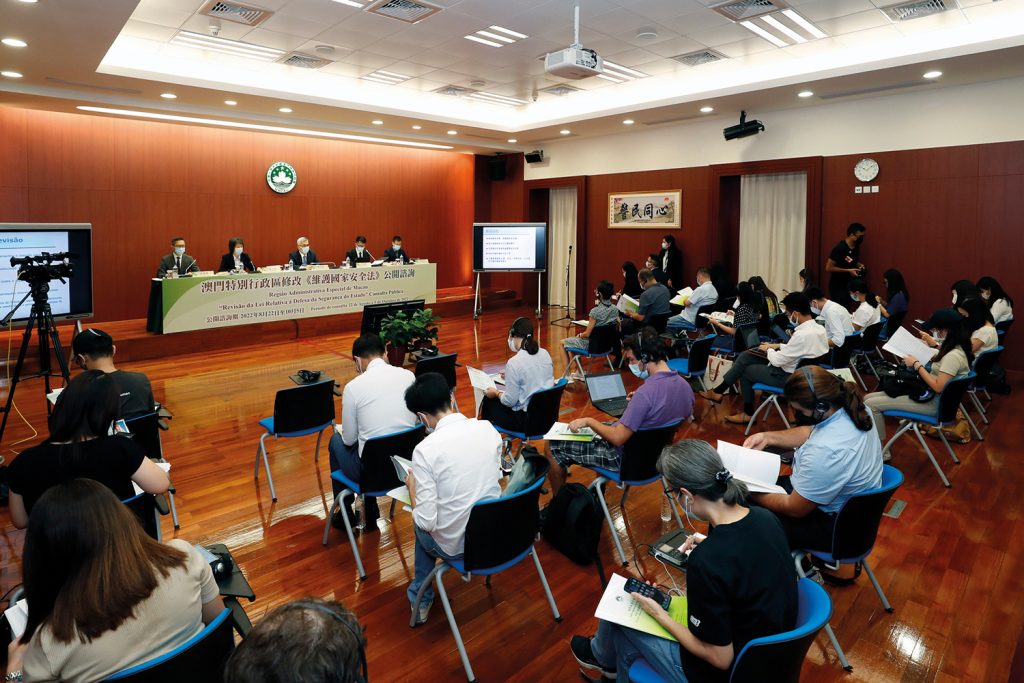
According to the consultation document, the local government proposes that secession by non-violent illegal means should also be punishable.
Article 2 of the current version of the local national security law, concerning the crime of secession, covers those who use violence or other grave illegal means in an attempt to separate the Chinese territory from the nation or subject it to the sovereignty of another state.
The local government also proposes that subversion against the Central People’s Government, as defined by Article 3 of the current local national security law, should be extended to subversion against the political power ruling the nation.
The document notes that the current version only covers subversion by violence or other grave illegal means. The local government proposes that subversion by non-violent illegal means should also be punishable.
Moreover, the local government also proposes to widen the definition of the crime of sedition as enshrined in Article 4 of the current version of the local national security law. The current version covers those who publicly and directly incite others to commit treason, secession or subversion against the central government.
The consultation document proposes to also punish those who publicly and directly incite others to participate in turmoil endangering national stability.
While the current version of the local national security law targets “foreign” political organisations or bodies endangering national security in Macao, the government now proposes that the crime should be extended to organisations or bodies “outside” the MSAR.
Wong noted that “external hostile forces do not only come from foreign countries but can also from non-foreign regions outside Macao” and that “organisations or bodies that endanger national security are not necessarily political ones”.
According to the document, the government also proposes the setting-up of specific criminal procedures to tackle cases of endangering national security, such as barring people under investigation for suspected national security law violations from leaving Macao for up to five days.
The government also wants to introduce specific measures to intercept telecommunications with the aim of preventing crimes endangering national security.
For Secretary Wong, the Hong Kong riots and violent protests against the government in 2019 are stark reminders that Macao needs to improve its national security “with the aim of preventing Hong Kong’s previous chaos from happening in Macao”.
In addition, Wong also said during the press conference that the government aims to publish a report at the end of October summarising the findings of the ongoing public consultation process, after which it will be able to submit the amendment bill to the Legislative Assembly in early November for debate and vote.
